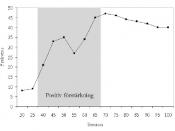Businesses - The Real World You Never Saw Audience: Business people Recently, I obtained a job opportunity at the corporate retail store Best Buy. Having worked there for about a month already, I have earned two, two-week paychecks and I will be receiving my employee discount in two more weeks. My supervisor and coworkers have also acknowledged me for the repetitive sales that I have been making in our Home Theater department. In short, I am receiving a great deal of praise and positive feedback around the workplace. Therefore, in reading Tom Peters' article, "Incentives for Success," I just could not understand how there could be too little positive reinforcement in the business world these days.
Throughout the article, Tom Peters threateningly critiques Alfie Kohn's argument "Incentives Can Be Bad for Business." In terms of attack and counter attack on the writer's viewpoints, Peters' response to Alfie Kohn's argument is clearly ingenious.
Peters clearly argues and frames his point of view on the opinions that: praise is better than punishment, there is "far too little positive reinforcement" rather than too much, workers ought to be recognized more for their efforts, rewards can stifle innovation, and that "competition is [still] the chief motivator for individuals and groups" (4-6). Peters further mentions that: It's not easy to develop a good incentive system, and there are undoubtedly thousands of ways to construct useless, even damaging ones. To read Kohn's article, you might think that bad incentive systems are the rate at most companies. The truth, however, is that most companies don't offer any incentives at all to their employees, except to a thimbleful of folks at the top. (5) On the lineup, Peters' and Kohn's thoughts and ideals over incentives are well balanced. However, I find that Peters is pursuing a gradual defeat on the topic of competition. Moreover, Peters' viewpoints and observations are so contradictory and outdated that I worry that he does not live in "the real world of business" these days.
Peters does a mediocre job at best in explaining that what businesses need is a lot more positive reinforcement and a lot less of the negative kind throughout the corporate landscape. However, in explaining about it, Peters contradicts himself and gives Harvard psychologist B.F. Skinner way too much credit. Skinner could be "the popularizer of positive reinforcement" or "the one who discovered that aperiodic (random, unexpected) 'schedules of reinforcement' are much more powerful shapers of future behavior than periodic (routine, expected) schedules," but for someone who is reading Peters' article, one would personally like to hear what Peters has to say regarding this topic instead of some Harvard psychologist with an expensive education (4). I agree with Peters in understanding that negative reinforcement does more harm than good, but to me, Peters is a hypocrite in saying that there should be far less criticism and more positive appraisals, when he, himself, is criticizing Kohn's argument on incentives. Peters even says, "Negative reinforcement (criticism) is far and away the most common means by which American companies try to influence performance. They constantly tell people what they did wrong, rather than what they did right" (4). Sure, positive reinforcement beats negative reinforcement any day, but why preach about something that one does not even practice. "Negative reinforcement - even if well intended - seldom leads to improved performance," as Skinner once showed (4).
Even though Peters is correct about "the average employee [who] faces a daunting array of hurdles and uncertaintiesâ¦simply to make it through the day," he barely manages to ease his way through his response on the almost total absence of positive reinforcement (5). Anyone who has spent time observing the real-life business practices of today knows that Peters' assumption is a plain and simple hasty generalization. I was absolutely surprised in shock at how Peters could hastily say that there is a total absence of positive reinforcement these days in the business world. I, myself, used to work at a cutlery corporation called Cutco, a job that basically revolves around the sale of kitchen cutlery to the average homemaker, and every moment when I would enter the main office in Saratoga, I would receive a plethora of compliments, congratulations, positive suggestions, and pats on the shoulder even when I did not even sale a single table knife or spatula spreader. There would also be team meetings where everyone would help each other in learning new sales strategies, talk about their experiences with customers, and hand out prize incentives for being able to sale certain numbers throughout every two weeks. Even outside of the business, the corporation would hold company gatherings once in a while at Johnny Rockets, or a casual, leisurely company picnic to thank each other for a job well done. On a personal note, it seems that I receive a lot more positive reinforcement than Peters does. It may be a hasty generalization, but maybe Peters never got enough positive reinforcement around his working environment. If he would like, I would be glad to give Peters a job well done for his clever, irrational thinking.
Throughout the whole entire article Peters tries to build up his own personal ethos and logos, but when he argues that competition is the chief motivator for individuals and groups, everything completely unwinds. I especially detest and oppose Peters' statement that "Competition is still the spice of life," as Peters, points out in his response. For one thing, competition is destructive, counterproductive, and can ruin relationships among the world field. Kohn even states, "The best amount of competition in a company - or anywhere else, for that matter - is none at all" (7). True, competition can work wonders and increase the opportunities to make more money, but competition brings out the worst of all of us. Competition equals out to too little attention to quality and the destruction of common friendships. It even puts everyone at each other's necks, especially when there are incentives based on the task at hand. From my own personal experience at Best Buy, I have witnessed the terrible outcome of competition at other chain stores. Being a new worker put out on the floor during the first day of work at Best Buy, I was not trained adequately enough to meet the questions and suggestions that the customers had. Not only was I not trained yet, but I was also being scored on the number of performance service plans and accessories that I could sell. Since I had less time to practice my strategies for selling, I provided bad customer service to my customers. Luckily, Best Buy does not work on commission, so it provided a friendlier environment for learning and making new friends. Now the opposite of my situation applies to Good Guys or Fry's. These stores sure make it harder to make acquaintances at work, to provide quality service, and to understand how to meet the customer's needs. Kohn once said, "A contest sets us against one another, so that my success makes yours less likely. In reality, we have a great deal to fear from too much competition, and any amount is too much" (7).
Although Peters' article contradicts itself, I do have to give Peters some credit when he mentions that praise is better than punishment. Negative reinforcement is far worse than positive reinforcement. Sometimes when not meant to, a comment can lower one's self esteem and degrade their working performance. Without backing up criticism with a positive comment or phrase can make the person think that they really are not important to the business's success and achievements. It even makes the work environment less pleasurable and exciting. Eventually it becomes a boring job that serves only one purpose: money. With this thought in mind, the quality of work or service provided becomes minimal to meet the basic requirements when assigned a certain task to carry out. It is proper to say that workers ought to be recognized more for their efforts. Just a simple positive reinforcement like "Thanks for helping me today. It sure is a good thing that you work here. I don't know what I'd do without you," can change one's perspective on work.
Overall, Peters is addressing matters of general liability, since his resources appear to be so outdated. Peters also keeps rambling on and on about the excessive need and emphasis on positive reinforcement and competition in American business. Even though the business world already has plenty of positive reinforcement, it sure would not hurt to receive a couple more praises every day, but businesses definitely do not need all that competition. Likewise, we should not welcome competition, even with good intentions. We have competitive pressure to thank already for the destructive things that are occurring in large companies these days. Peters has much to say that is comical and persuasive, and that ought to be checked. Life sure is not simple, as in the example of the New Yorker cartoon that Peters is reminded of, but we live in the real world; what may appear true in comics, certainly is not in business. If I were Peters, I would stop readily believing what people say in comics and begin taking shots of reality once in a while.





